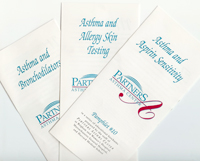Asthma & Aspirin Sensitivity
For the vast majority of persons with asthma, taking aspirin
has no effect on their asthma, either good or bad. However, for
perhaps 3-5% of persons with asthma, aspirin can cause asthma to
worsen, often in the form of a severe and sudden attack. Besides
causing symptoms of asthma, aspirin can cause nasal congestion
and abdominal pains in susceptible individuals. Most often, this
sensitivity to aspirin develops in adulthood. It often is found
in conjunction with nasal polyps (growths of extra nasal tissue
that plug the nasal passageways).
Many persons with asthma have been advised by their physicians to
avoid aspirin because of their asthma. This advice is
precautionary, given on the possibility that you may have a
sensitivity to aspirin. The only way that you can tell with
certainty if you are sensitive to aspirin (and related
medications) is to have experienced a bad reaction with your
asthma after taking one of these medications. This pamphlet has
been prepared to help patients who do have aspirin sensitivity to
avoid all aspirin-related and aspirin-containing medications that
might cause them problems.
How aspirin causes problems in some persons with asthma
Research (much of it done at the Brigham and Women's Hospital) has shown that in asthmatic persons sensitive to aspirin, aspirin causes the body to produce excess amounts of the class of chemicals known as leukotrienes. Leukotrienes cause the muscles surrounding the bronchial tubes to contract, resulting in wheezing and shortness of breath.
The best protection is avoidance
Although there are now medicines, the leukotriene blockers (such as zafirlukast, brand name: Accolate®; montelukast, brand name: Singulair®; and zileuton, brand name: Zyflo®), that help to protect against this overproduction of leukotrienes, the best protection for someone with aspirin-sensitive asthma is still avoidance. Avoiding these potentially dangerous medications can be difficult, for two reasons.
Identifying the medicines that can cause problems
First, not only is it necessary to avoid aspirin, it is
equally important to avoid all medicines of the family called
"non-steroidal antiinflammatory drugs." These medicines, such as
ibuprofen and naproxen, are used to treat the inflammation of
arthritis and are routinely taken as pain killers. Just like
aspirin, they can cause severe attacks of asthma in persons with
aspirin-sensitive asthma. Incidentally, they do not help the
inflammation of the bronchial tubes in asthma.
Second, both aspirin and non-steroidal antiinflammatory drugs are
sold over-the-counter in a variety of preparations and under many
different names. One must be careful to read labels on
over-the-counter cold remedies, allergy medicines, pain killers,
and relievers of stomach discomfort, many of which contain
aspirin.
Acetaminophen (Tylenol®) is safe to take
For persons with aspirin-sensitive asthma, acetaminophen (brand name: Tylenol®) is generally safe to take and can be used as a substitute for aspirin or non-steroidal antiinflammatory drugs in most instances.
The medicines that persons with aspirin-sensitive asthma should avoid
A list of medications, both prescription and over-the-counter, that contain aspirin and non-steroidal antiinflammatory drugs is provided in this pamphlet for persons with aspirin-sensitive asthma. Because this list may not be perfectly complete and because new medications are continually being introduced, it is best to read the label of any new medicine that you take, and, when in doubt, ask your pharmacist or asthma care provider about it.
Over-the-Counter Medications |
|
Aspirin |
|
|
|
|
|
|
|
Non-Steroidal Antiinflammatory Drugs |
|
|
|
|
|
|
|
|
|
Aspirin-Containing Medications |
|
|
|
|
|
|
|
|
|
|
|
|
|
|
|
Prescription Medications |
|
Aspirin-Containing Medications |
|
|
|
|
|
Non-Steroidal Antiinflammatory Drugs |
|
|
|
|
|
|
|
|
|
|
|
|
|
|
|
|
|
|
|
|
|

